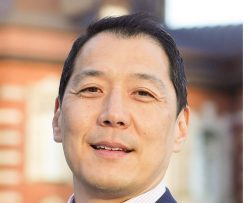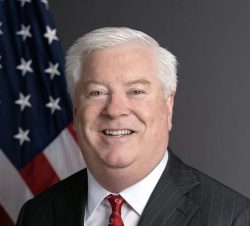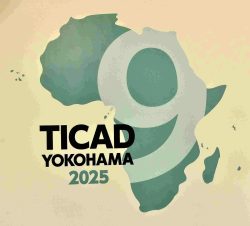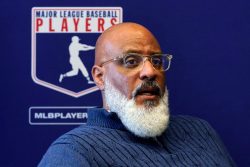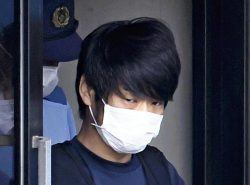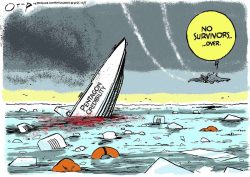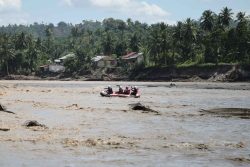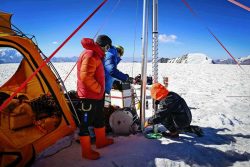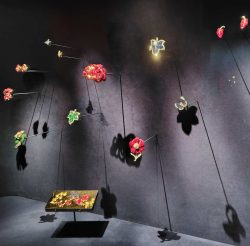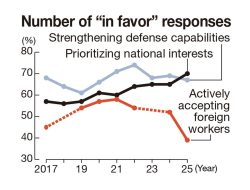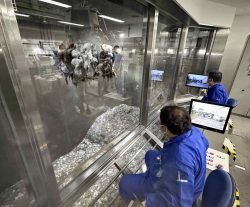12:50 JST, February 18, 2021
The woman walks briskly across the airport, her khaki jacket perfectly matched with a chunky piece of exotic jewelry around her slender neck. When a Homeland Security agent stops her to search her belongings, a blackened human skull rolls out of her messenger bag — gasp! We quickly learn that she is a scientist from the prestigious Jeffersonian Institute, returning from a trip to Guatemala where she spent two months analyzing the remains of genocide victims. Meet Dr. Temperance “Bones” Brennan, the heroine of the popular TV show “Bones,” which aired in the U.S. from 2006 to 2017.
Anthropologically speaking — to borrow Dr. Brennan’s favorite preamble — this introduction of the fictional forensic anthropologist is at once appalling and intriguing. It is appalling because no trained scientist would carry around an unprotected specimen and risk breakage and contamination. And no one with a tinge of intelligence would even think of transporting human remains across borders mixed in with their personal belongings in this day and age. Yet, Dr. Brennan is incredulous when her scientific credentials fail to convince the Homeland Security agents.
Her character is also intriguing to me for the mixed truth it tells about what “anthropology” is and how an “anthropologist” behaves. I’ve seen among my fellow anthropologists a cavalier attitude toward the personal risks involved in fieldwork in faraway places; the nonchalance with which Brennan handles human remains is also realistic for a forensic scientist. Many real-life anthropologists I know wear jewelry and clothing from the region of their research (like Dr. Brennan’s necklace). But honestly, I’ve never known an anthropologist, male or female, who looked so pale and posh after weathering two months of fieldwork under the tropical sun.
Another intriguing quality of Dr. Brennan is her single-minded adherence to scientific objectivity, reinforced in every episode as she solves murder cases based on the hard evidence she gathered from the decomposing corpse. Bones are the gold standard of hard evidence: the second hardest part of a human body (next to teeth), they withstand destructive elements and preserve incontrovertible traces of malicious acts, decipherable only to a trained scientist. Dr. Brennan’s belief in science is matched only by her disdain for more “subjective” branches of social science (like archaeology and psychology) and her nonscientist colleagues, whom she sees as incapable of rational thought.
It is true that some anthropologists share Dr. Brennan’s trust in hard evidence and scientific methods, but this is only a partial picture. Anthropology is a diverse field unified by the pursuit of one principal question: what it means to be human. Human beings are multifaceted, and we need a variety of approaches to comprehend our species in its totality. As the American Anthropological Association puts it, anthropology is “most humanistic of sciences and most scientific of humanities” and our disciplinary enterprise “irreducibly social,” or inseparable from the collective life of human beings.
By the second season, we discover that Dr. Brennan’s overt scientism is also “irreducibly social.” At first, her scientific mindset is presented as the cause of her social awkwardness and seeming lack of empathy (in fact, she was called a “sociopath” by a Homeland Security agent in the opening scene) — the antithesis of humanity. While she is at ease in the company of other “squints” (or nerdy scientists), her simultaneous attraction and resistance to forming human connections becomes painfully accentuated against nonscientist characters, especially the all-human FBI agent Seeley Booth. Then, we learn in the second season that her antisocial behavior had even deeper social roots. It is the product of her troubled childhood and alienation from her birth parents.
As the season progresses, her sidekicks also begin to have lives of their own: They fall in and out of love with each other, leave the team, come back, get married and have children. The excitement of scientific analysis and solving crimes is couched in the collaboration and comradery — albeit with occasional friction — between Brennan and her sidekicks. Even Brennan herself comes to admit that her success as a scientist depends on her team and, therefore, is irreducibly social.
After dancing around their mutual attraction for six long seasons, Brennan and Booth get together and have a child in the seventh season. During an awkward process of defining the meaning of this most human of connections, Brennan often finds refuge in her scientific work, running back to her lab to avoid confronting her complex feelings about her parents and her new family unit. Things have a way of working themselves out, however. Her father, who emerged from his criminal past, becomes the caretaker of her infant daughter, finally bringing the turbulent family history that tormented Brennan all her life full circle.
I have a little secret to tell: Science and humanity are also the source of conflict for real-life anthropologists, whose intellectual differences often lead to professional disagreement. But I was lucky, as a graduate student on the humanistic side of anthropology, to have had the chance to argue and debate about the nature of humanity with the faculty and students from the other side of the house. We used to hurl jeers at each other during those long, rambling discussions as an empty pitcher of beer on the table grew to two and then three. Yet, we recognized the irreducibly social nature of our endeavor — that we needed one another to tackle the complex puzzle that is our species.

Sawa Kurotani
Kurotani is a professor of anthropology at the University of Redlands.
"Editorial & Columns" POPULAR ARTICLE
-

Corporate Interim Earnings: Companies Must Devise Ways to Overcome Trump Tariffs
-

Violations of Subcontract Law: Major Automakers Must Eliminate Old Practices
-

Local Governments’ Tax Revenues: Devise Ways to Correct Imbalances in Tax Sources
-

Takaichi’s Summit with Economics-Minded Trump Successfully Advanced Japan’s Security Interests
-

Lower House Budget Committee: Unrestrained Fiscal Stimulus Is Unacceptable
JN ACCESS RANKING
-

Govt Plans to Urge Municipalities to Help Residents Cope with Rising Prices
-

Japan Resumes Scallop Exports to China
-
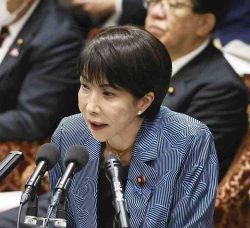
Japan Prime Minister Takaichi Vows to Have Country Exit Deflation, Closely Monitor Economic Indicators
-

Japan to Charge Foreigners More for Residence Permits, Looking to Align with Western Countries
-

JR East Suica’s Penguin to Retire at End of FY2026; Baton to be Passed to New Character


